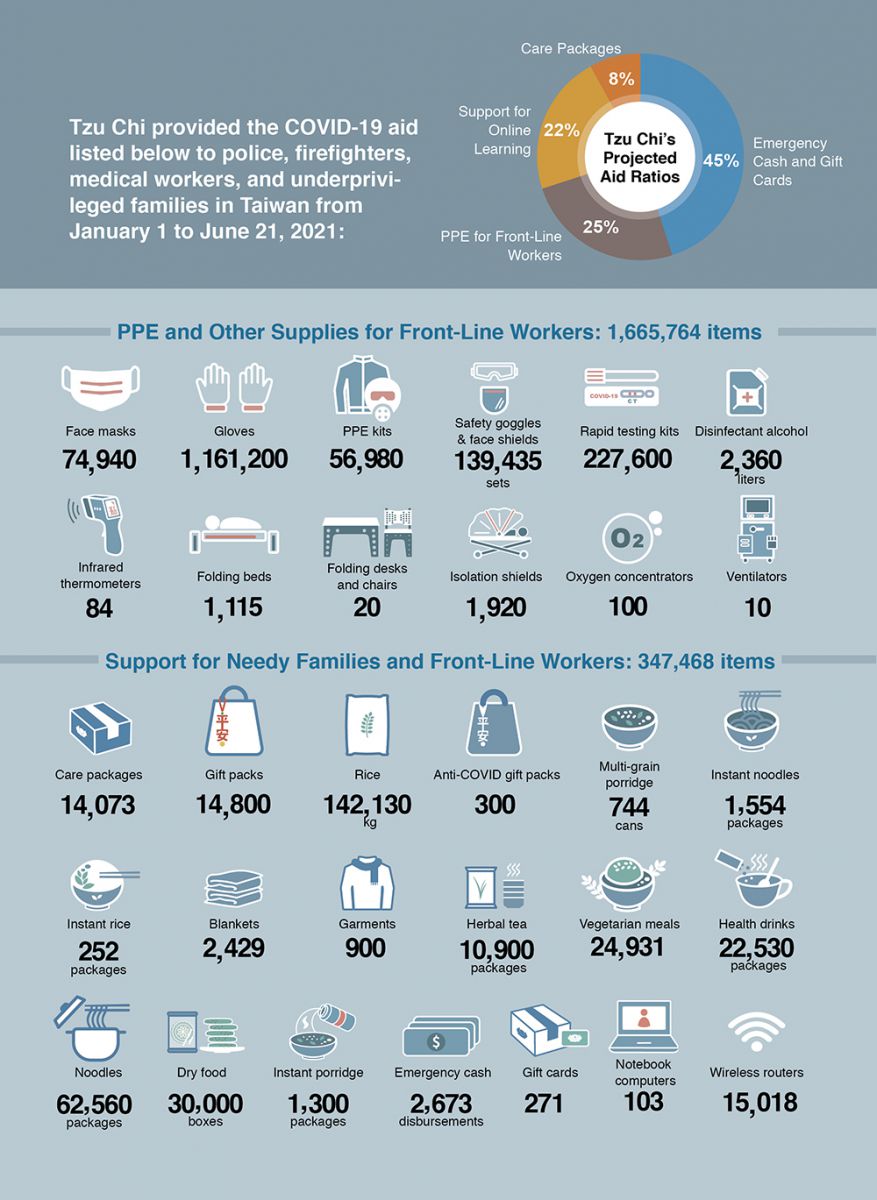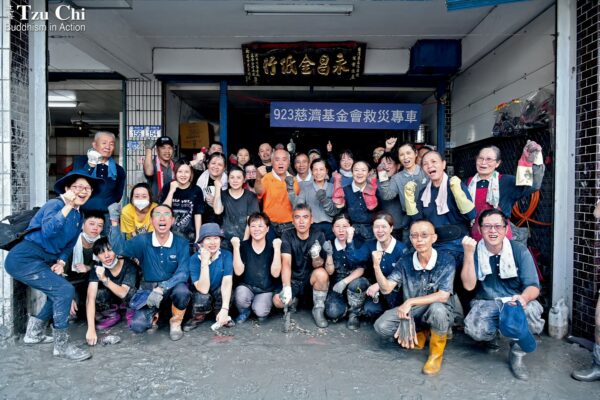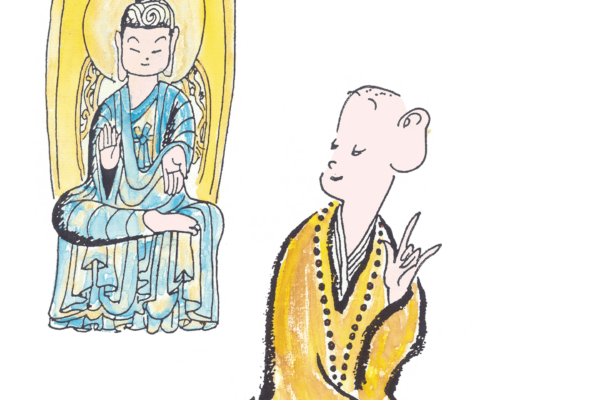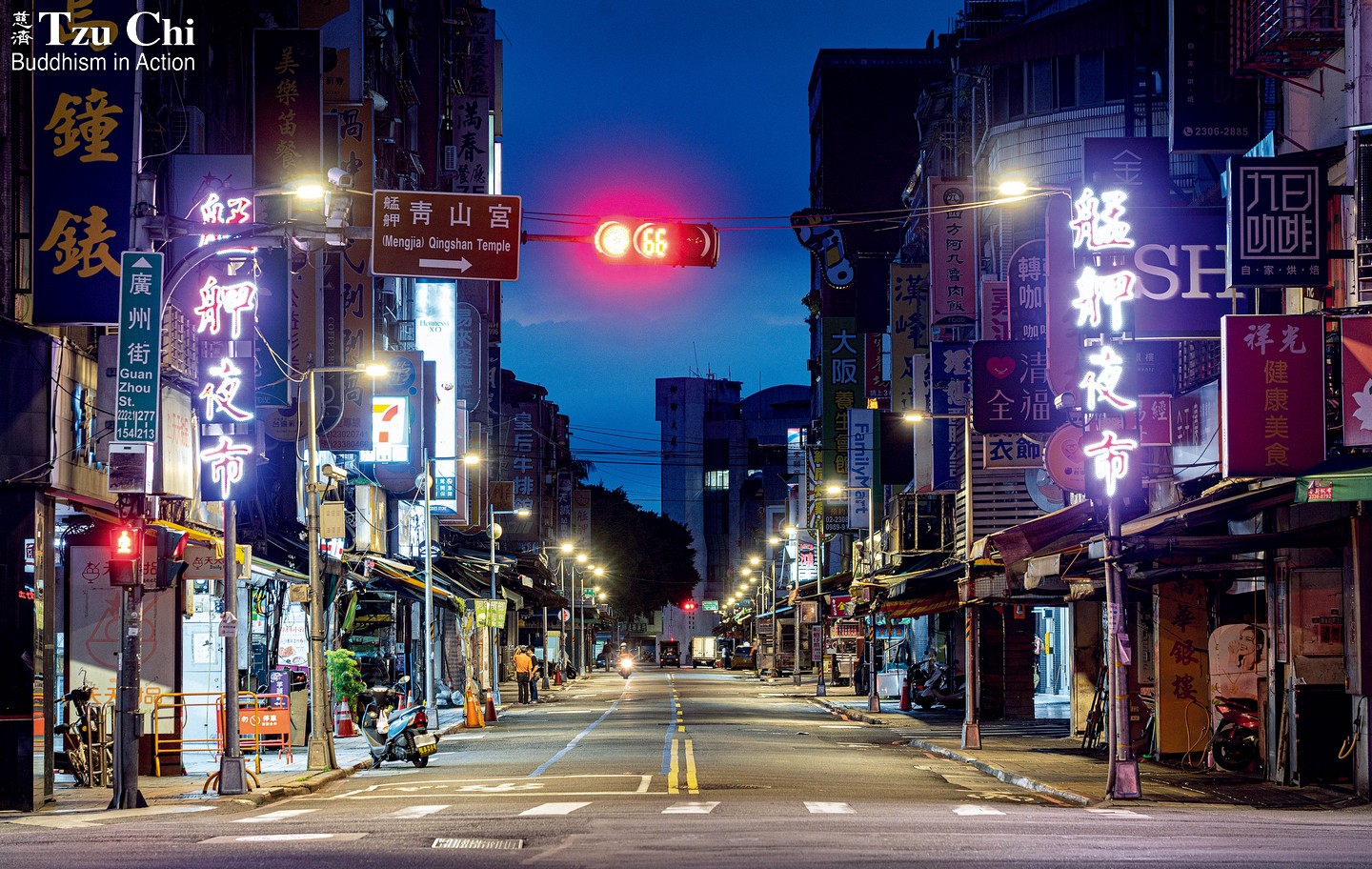
Wanhua, Taipei, was a COVID-19 hotspot after domestic cases began to increase rapidly in Taiwan in mid-May 2021. Roadside stalls and stores in the district were temporarily closed in accordance with pandemic policies. This was what Mengjia Night Market in Wanhua looked like on the evening of June 3, 2021, nearly three weeks after the COVID-19 alert for Taipei was raised to level three. The scene was a sharp contrast to what it is like on a typical bustling day (see inset photos). It is not hard to imagine the impact of the virus control measures on the local economy. Photos by Hsiao Yiu-hwa
By Liao Zhe-min
Translated by Tang Yau-yang
Photos by Huang Xiao-zhe
Tzu Chi has been taking action to blunt the impact of the coronavirus pandemic in Taiwan ever since the first local case emerged in late January 2020. When the pandemic became more widespread on the island in May 2021, Tzu Chi expanded its services to help more people in need. The foundation built outdoor screening stations in communities or for hospitals to increase Taiwan’s capacity to rapidly screen for the virus. They provided disadvantaged students with computers and internet access for online learning at home, and packaged and supplied relief goods for needy families. As long as COVID-19 poses a threat, as long as society has unfulfilled needs, Tzu Chi will be there to help.
We in Tzu Chi have been in the fight against the pandemic for more than 500 days now,” said Yen Po-wen (顏博文), CEO of the Tzu Chi charity mission. “We’ve never stopped taking action to help.” The first domestic case of COVID-19 was diagnosed in Taiwan on January 28, 2020, the fourth day into the Lunar Year of the Rat. On that very day, Tzu Chi established a daily morning meeting at its headquarters in Hualien, eastern Taiwan, to organize and coordinate its response. For example, when the need for face masks spiked in Taiwan, volunteers swung into action to make cloth masks to help relieve the shortage. The foundation also provided people in quarantine with gift packs and financial assistance to families or students impacted by the pandemic.
The anti-coronavirus actions that the Taiwanese government took in 2020 successfully warded off COVID-19 and kept the virus mostly at bay, allowing Tzu Chi to focus most of its resources on aiding viral hot spots outside of Taiwan. But when the pandemic situation on the island took a turn for the worse in May 2021, the Tzu Chi headquarters pivoted its focus back to Taiwan.
The foundation quickly extended aid to several sectors in society. It donated personal protective equipment (PPE) to support medical professionals working hard to take care of an increasing number of people diagnosed with COVID-19, and also to other front-line workers including police, firefighters, and military personnel. And when the COVID precautionary measures enforced by the government made it hard for underprivileged families to maintain their livelihoods, the foundation provided daily necessities and emergency cash to help see them through the crisis. Throughout it all, the number of volunteers mobilized to deliver the aid was kept at a minimum to prevent the spread of the virus. This was in accordance with the government’s safety protocols.
Weng Qian-hui (翁千惠) is a Tzu Chi volunteer who has long helped provide support and care for the police. Though her movements outside her home were curtailed due to the pandemic, she decided to focus on the productive things she could do instead of giving in to fear and worry. She asked herself, “What can I do? What more can I give back to society?” She talked to some police officers and firefighters she knew and asked about their needs, then worked with the Tzu Chi Association of Police, Firefighters, and Their Families to pool together resources to donate some PPE. Finally, she got a few volunteers together and, donning masks and face shields, delivered the needed PPE to these front-line workers.
After the pandemic situation got worse in Taiwan, volunteers switched from personally visiting needy families under Tzu Chi’s long-term care to calling them at home. In the second half of May alone, volunteers in northern Taiwan made more than 5,000 such calls. Volunteers had also been making face shields at the Tzu Chi Kaohsiung Jing Si Hall in southern Taiwan, but switched to making them at home to stay in compliance with regulations limiting the size of gatherings. These examples demonstrate that though volunteers made adjustments in response to changing circumstances around the pandemic, they never wavered in their dedication to spreading love and warmth.
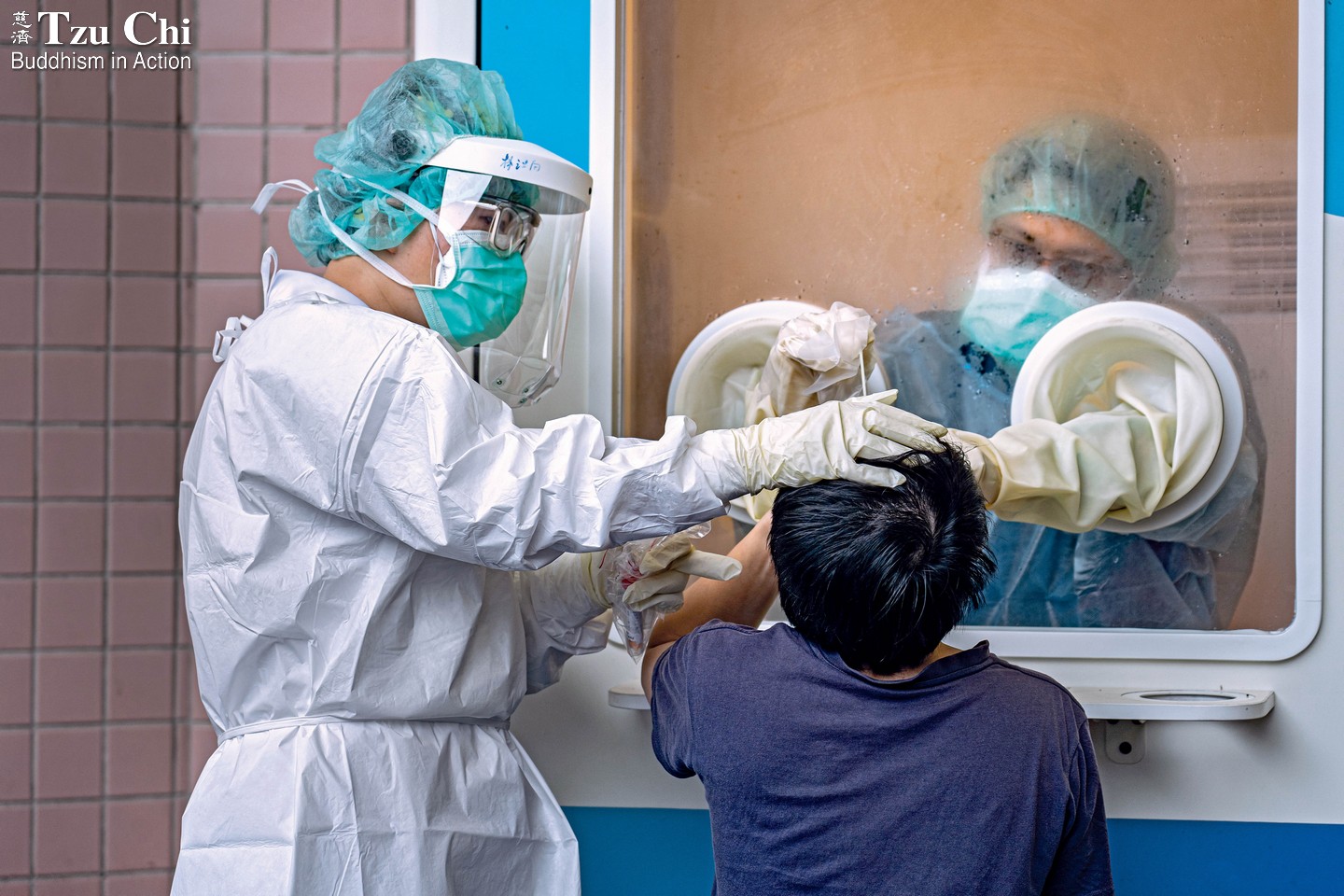
A medical worker at the Yangming branch of Taipei City Hospital collects a sample from a man for rapid testing for COVID-19. A surge in confirmed coronavirus cases in Taiwan during May and June resulted in a spike in people scrambling to be tested for the disease. Hsiao Yiu-hwa
Meals and screening stations
On May 15, the Taiwanese government raised the COVID-19 alert level for Taipei and New Taipei City to level 3, the second highest level. Four days later, on May 19, the same alert level was expanded to the entire island. Pandemic regulations forbid restaurants from providing dine-in services; only take-out orders were allowed. Ji Ya-ying (紀雅瑩), a Tzu Chi volunteer in Taipei, explained that she and other volunteers pooled funds with the Tzu Chi Friends Association and the northern chapter of the Tzu Chi Honorary Board Members Association and found restaurants to make vegetarian boxed meals, which were delivered and given to front-line workers free of charge. Not only did it help restaurants stay afloat during the crisis, but it was a great way to honor and thank front-line workers. A participating restaurateur in Taipei said of this experience, “I hope that the veggie energy in the meals will fill the recipients with vitality and vigor.” This program went on for two weeks.
One of the persons that benefited from the program was Chen Mei-hui (陳美慧), a head nurse at Taipei Tzu Chi Hospital. Many front-line workers, like Chen, wore protective clothing and gear that covered them from head to toe when they cared for COVID patients. It was quite an undertaking for them to put on such an outfit, so they often spent long periods of time wearing it. They had no choice but to endure the discomfort that came with such clothing. Trapped body heat and moisture were uncomfortable and going to the bathroom was very inconvenient. Witnessing them endure such discomfort and inconvenience to care for patients, Ji Ya-ying wanted to do something for them to cheer them on. Her solution was to provide the boxed meals so that when they finally took off their protective gear for meal breaks, they could have quality food to eat immediately. The meal project also promoted vegetarianism and the idea of not killing animals for food. By inspiring love and compassion in people’s hearts like that, Ji hoped to create blessings for the world and help the pandemic end as soon as possible.
After receiving meals from this project, Nurse Chen wrote a thank-you note to the volunteers who organized this project: “Our pandemic team here has received your lunch of love, which not only fed us but also bolstered our spirits to keep on fighting the pandemic. We are very touched that you arranged to have such delicious vegetarian meals delivered to us. Even our non-vegetarian colleagues enjoyed eating the food. You’ve truly nourished us with your love and care. It’s great to have you around.”
Like nurses, police officers were kept especially busy after confirmed coronavirus cases started to surge in May. They helped with contact tracing and urged people to put on face masks—and that was on top of their usual work of conducting patrols, issuing citations, and handling traffic accidents or law enforcement cases. Their work often involved close physical encounters with people and as such elevated their risk of infection. Realizing the risks they were exposed to, Tzu Chi donated protective clothing, gloves, and disinfectant alcohol to the police across Taiwan to help protect them from infection.
Tzu Chi set up two prefabricated buildings and donated them to the Tainan City Government to be used as COVID screening stations, one at Xinhua Sport Park (top left) and the other at the Tainan Songbo Recreational Center (bottom left). The buildings were completed two days ahead of schedule, despite the fact that workers had to work in the rain. The stations provide a comfortable and safe place in which to work as well as expand the screening capacity of the city.
As the number of people in Taiwan who needed to be screened for the coronavirus skyrocketed, many screening stations found that they didn’t have the capacity to handle the volume. As a result, local governments reached out to the foundation asking for help to set up prefabricated buildings to be used as screening stations. Tzu Chi volunteers checked the sizes of the proposed sites for the stations, and quickly found professional help to acquire building materials and do the assembly work. By mid-June, Tzu Chi had completed 25 such screening stations spread across 11 counties and cities in Taiwan.
One of the prefabricated stations is located at the Yangming branch of Taipei City Hospital, Taipei. It is a high-grade screening station, 855 square feet, complete with a waiting area and a rest and observation area. Deng Nai-ren (鄧乃仁), a staffer with Tzu Chi’s Construction Department, was in charge of this construction project. He said the contractor, upon learning how the project would serve the public interest, did everything in his power to speed its completion. This included rushing orders for materials and asking for overtime from the limited number of workers he had. Similarly, another team of foundation staffers and professional workers in Tainan worked in the rain to finish two screening stations in just five days, one at Xinhua Sport Park and the other at the Tainan Songbo Recreational Center. The two stations were donated to the Public Health Bureau of the Tainan City Government for use.
Helping hand for disadvantaged children
The public was urged to minimize their outings when the pandemic alert was elevated to level 3 on May 15 for Taipei City and New Taipei City. Anticipating that some disadvantaged families would have difficulty purchasing daily necessities or even lose their jobs, New Taipei City’s Social Welfare Department contacted Tzu Chi and asked the foundation to help provide daily necessities for needy households in the city. Tzu Chi quickly made the required purchases and packaged the goods. In just five days, they had delivered 3,000 care packages to the social welfare centers in Sanchong and other locations for New Taipei City’s Social Welfare Department to distribute to needy families. Each package contained more than 10 items, including noodles, biscuits, multi-grain porridge, and rice. It was welcome relief for struggling families.
Huang Feng-ming (黃逢明), an official from the Social Welfare Department, pointed out that each care package had changed the way things would unfold for each recipient family. For example, a grandma raising her grandson alone in a skip-generation family had been worried that her grandson would go hungry as her income stream had been disrupted, but she could now breathe easier with Tzu Chi’s aid in hand. Each care package also contained a copy of Jing Si Aphorisms, a book of wise sayings by Dharma Master Cheng Yen. A recipient family had been placed in quarantine because one of their family members had been diagnosed with COVID-19. This upset the family and left them feeling unsettled, but they gradually settled down after reading passages from the Jing Si Aphorisms book that was contained in the care package that they had received.
Huang Feng-ming said that though the pandemic had disrupted many families’ lives and adversely affected many people’s livelihoods, he was deeply moved to see government and private sectors working together to help everyone through this difficult time. The love and warmth from society would surely go a long way to lessen the impact of the pandemic.
The Ministry of Education announced on May 19 that all schools would be closed for in-person classes but that instruction would continue online. Tzu Chi volunteers called the needy families under their charge and quickly learned that some of the low-income families did not have computers for online learning. As a result, their children were forced to use cell phones to join the online classes, a very difficult task given the small screens of the phones. Volunteers brought this issue to the attention of Tzu Chi social workers. After evaluating the situation, a decision was reached to subsidize the families for the purchase of computers. Some volunteers who had extra notebook computers to spare also donated them to help underserved students learn remotely.
Chen Yi-shi (陳宜適), a Tzu Chi social worker based in northern Taiwan, gave an example. A girl in a family under Tzu Chi’s long-term care was studying advertising design in a vocational high school. She did not have a computer, so she often had to borrow one from her classmates just to complete her homework assignments. Her teacher noticed the quandary of this hardworking girl and reported her situation to a Tzu Chi volunteer. Volunteers helped the girl pick out a computer suitable for her specialized learning. She now has no problem following her school’s online courses.
Tzu Chi also helped some families pay for broadband connections for three months to facilitate at-home learning. The foundation also joined a project to provide wireless routers for underserved students. This project came about after Professor Yeh Ping-cheng (葉丙成) of the Department of Electrical Engineering at National Taiwan University and his team discovered during the pandemic that nearly 20,000 underprivileged students in Taiwan had no access to the Internet at home. He therefore sought out Tzu Chi for help to provide wireless routers for these students. Other organizations that participated in this project included KKday, an e-commerce travel platform, and Jetfi Technology Company. The project was able to obtain 15,000 wireless routers, which Tzu Chi would rent for two months. The devices were sent to government educational departments across Taiwan on June 7 for distribution to underserved students.

Jing Si Abode nuns and foundation employees pack relief goods to be delivered to underprivileged families. Liu Qiu-ling
The Level 3 alert was scheduled to remain in force until July 12, into the summer vacation for schools. To ensure that disadvantaged children have enough to eat during the break, Tzu Chi reached an agreement with the Keelung City Government on June 11 to help feed those children. The foundation planned to provide more than 2,000 needy families in Keelung with vegetables, fruit, and other food. The food will be delivered to the families in two installments in July and August. Volunteers are in discussion with other local governments about similar initiatives.
“Many people have asked me what Tzu Chi has done during the latest pandemic wave in Taiwan,” CEO Yen Po-wen said. “I tell them that Tzu Chi has been around all along doing all sorts of things to help out. We’ve actually kept very busy.” The CEO explained that just procuring and packaging the goods to be provided to people in quarantine (who received gift packs) and needy households (who received care packages) had been an enormous task, but it was made even harder due to the government’s COVID regulations, as it was impossible to assemble volunteers to work together in large groups during this time. As a result, the nuns at the Jing Si Abode and foundation employees in Hualien had done most of the packaging work. “The Jing Si Abode has always provided the most solid support for Tzu Chi volunteers around the world,” said Yen.
Upholding the spirit of “great mercy even to strangers and great compassion for all,” the foundation has always striven to deliver hope to suffering people. “Our records show that from January to mid-June 2021, Tzu Chi donated more than two million items in Taiwan to aid front-line workers in the battle against COVID-19 and to help tide needy families over during this trying time,” Yen continued. “That sheer number, two million, tells a story that we in Tzu Chi have never stopped working. So long as the pandemic persists, our anti-COVID efforts will never come to a halt.”
